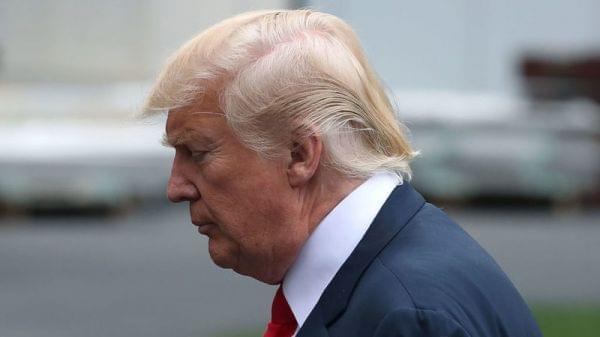Trump Calls Out KKK, White Supremacists 48 Hours After Charlottesville: ‘Racism Is Evil’

President Trump walks toward the White House after stepping off of Marine One on Monday morning. Mark Wilson/Getty Images
Almost 48 hours after violence engulfed Charlottesville, Va., President Trump called out white nationalist groups by name. Trump's remarks on Monday followed criticism that his initial statement about the clash of protesters did not condemn racist groups specifically.
"Racism is evil, and those who cause violence in its name are criminals and thugs, including the KKK, neo-Nazis and white supremacists and other hate groups that are repugnant to everything we hold dear as Americans," the president said from the White House.
Racism is evil, and those who cause violence in its name are criminals and thugs..."President Donald Trump
Trump began his remarks talking about his economic accomplishments and plans for trade negotiations before turning his attention to the events over the weekend in Virginia. After the Charlottesville City Council had voted earlier this year to remove a statue of Confederate Gen. Robert E. Lee from one of its parks, white nationalists groups — including white supremacists, the alt-right, the Ku Klux Klan and neo-Nazis — descended on the city for a "Unite the Right" rally.
On Friday night, they marched on the normally sleepy college town, home to the University of Virginia, carrying torches. On Saturday conditions turned deadly as hundreds of the white nationalists, some carrying Confederate flags and shields and others in militia-like gear, clashed with counterprotesters in the city streets.
At one point a silver Dodge Challenger, allegedly driven by 20-year-old James Alex Fields Jr. of Ohio, rammed into a street filled with counterprotesters. Heather Heyer, 32, was killed, and at least 19 others were injured. Fields was charged with one count of second-degree murder, three counts of malicious wounding and one count of hit-and run.
President Trump expressed sympathy to Heyer's family, as well as to the families of Virginia State Troopers Lt. H. Jay Cullen and Berke M.M. Bates, who died when their helicopter that was patrolling Saturday's event crashed.
"These three fallen Americans embody the goodness and decency of our nation," Trump said. "In times such as these, America has always shown its true character, responding to hate with love, division with unity, and violence with an unwavering resolve for justice."
Trump spoke after meeting with newly installed FBI Director Christopher Wray and Attorney General Jeff Sessions at the White House. He said that the Department of Justice had opened a civil rights investigation into the car attack.
"To anyone who acted criminally at this weekend's racist violence, you will be held fully accountable. Justice will be delivered," the president said.
Sessions told ABC News on Monday morning that the car crash that had killed Heyer "does meet the definition of domestic terrorism."
"You can be sure we will charge and advance the investigation towards the most serious charges that can be brought, because this is unequivocally an unacceptable, evil attack," he said.
The president's condemnations may be too little too late for those who criticized Trump's initial remarks — and Trump may have missed a critical moment to be the nation's healer-in-chief. On Saturday, Trump claimed that the clashes were a result of "hatred, bigotry and violence on many sides." Top Republicans, among others, quickly criticized him for not calling out by name the white supremacists, alt-right, KKK and neo-Nazi groups who began the protests.
"Mr. President – we must call evil by its name. These were white supremacists and this was domestic terrorism," Sen. Cory Gardner, R-Colo., who heads up the GOP Senate campaign committee, tweeted on Saturday.
These were white supremacists and this was domestic terrorism."Sen. Cory Gardner (R-Colo.)
The White House put out an unsigned statement on Sunday morning, saying that, "The President said very strongly in his statement yesterday that he condemns all forms of violence, bigotry and hatred and of course that includes white Supremacists, KKK, neo-nazi and all extremist groups. He called for national unity and bringing all Americans together."
Vice President Pence had gone further than the president in his own comments, telling reporters Sunday night while traveling in Colombia, "We have no tolerance for hate and violence from white supremacists, neo-Nazis or the KKK. These dangerous fringe groups have no place in American public life and in the American debate, and we condemn them in the strongest possible terms."
Trump has been blamed for being slow to criticize white supremacist groups in the past — even as he regularly attacks other targets on Twitter. During the 2016 campaign, Trump came under fire for not immediately disavowing the endorsement of David Duke, a former KKK grand wizard.
Duke, who attended the march in Virginia, said on Saturday that participants' aim was "to fulfill the promises of Donald Trump. That's what we believed in. That's why we voted for Donald Trump, because he said he's going to take our country back."
Duke later responded to one of the president's tweets condemning the violence by saying, "I would recommend you take a good look in the mirror & remember it was White Americans who put you in the presidency, not radical leftists."
Links
- Ohio Man Charged With Murder In Fatal Car Attack On Anti-White Nationalist March
- Illinois Legislators React to Charlottesville Violence
- Crowd Rallies In Response To Events In Charlottesville
- Racial Justice Task Force Seeks To ‘Actually Do Things’
- Campus Groups Use ‘Freedom Forum’ To Respond To Recent Racial Incidents
- U Of I Students Expected To Address Racial Tensions On Campus

